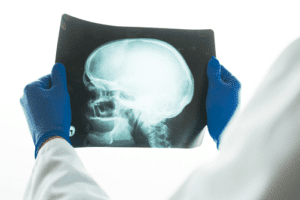What is a Skull Fracture?
A skull fracture is any break in the cranial bones. These kinds of fractures are caused by major impact or blunt force trauma to the head. Skull fractures may result in damage to the brain, depending on the severity of the impact.
Main Types of Skull Fractures

X-rays of the skull can objectively show a skull fracture.
There are four main types of skull fractures:
- Linear skull fracture: a break in the cranial bone characterized by a thin line that doesn’t splinter, depress, or distort the bone.
- Depressed skull fracture: a break in the cranial bone that causes the bone to move in toward the brain. Fractures like these may increase pressure on the brain.
- Diastatic skull fracture: More common in infants and young children, these fractures occur along the suture lines of the skill, widening them from their original state.
- Basilar skull fracture: This is the most serious type of skull fracture and occurs along the base of the skull, otherwise known as the cranial vault. Individuals with basilar skull fractures will often have bruising around their eyes and ears.
Always consult an experienced medical professional as soon as possible following a head injury.
Other Kinds of Skull Fractures and Injuries
Skull fractures can be characterized by other factors including visibility and location:
- Compound Skull Fracture: This is when part of the cranial bones exit the scalp and is visible through the skin, or a deep wound exposes the bone through the skin.
- Closed Skull Fracture: This describes skull fractures where the bone is broken but the skin is intact.
- Orbital Fracture: This is a fracture around the eye socket.
- Jaw Fracture (Temporomandibular Joint Fracture)
Symptoms of Skull Fractures
Symptoms that indicate a fractured skull may include:
- Abnormal pupils (unequal sizes, not reactive to light)
- Bleeding from the nostrils, ears, or around the eyes
- Difficulty balancing
- Facial bruising
- Loss of consciousness
- Swelling and tenderness around the area of impact
Sometimes, patients only experience a small bump on the head which can take up to 24 hours to develop. If you or a loved one has experienced a severe impact or blow to the skull, consult a medical provider as soon as possible.
What to Do if You Suspect a Skull Fracture
If you have reason to suspect you have suffered a skull fracture, you should seek immediate emergency medical care. These can be very serious and lead to even worse complications if not treated and evaluated properly. Talk to an attorney if someone else’s negligence cause it.

